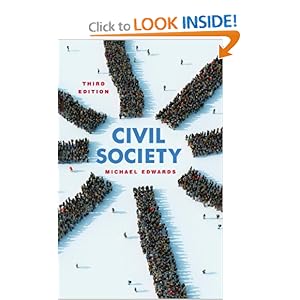- Facebook254
- Total 254
 The third edition of Michael Edwards’ invaluable book Civil Society is newly out, and Mike makes a strong argument on OpenDemocracy.net that draws from his book.
The third edition of Michael Edwards’ invaluable book Civil Society is newly out, and Mike makes a strong argument on OpenDemocracy.net that draws from his book.
He notes that nonprofit organizations are growing (by almost all measures) and offering significant benefits to the people and communities that they serve directly. There are, for example, 3.3 million registered charities in India. In our own work, we find that the number of nonprofits in a US community, adjusted for population, predicts that community’s economic performance (holding many other factors constant).
And yet, as Mike Edwards notes, the world is slipping backward on many fronts, as “economic inequality is rising, democracies are being hollowed out, climate change is worsening, and discrimination based on race, gender, ability and sexual orientation remains endemic.”
These are the kinds of issues that are traditionally addressed by governments. In turn, governments are helpful when broad-based social movements hold them accountable. (Benign elites are possible–but rare and usually short-lived–and, by definition, they cannot address a problem like the hollowing-out of democracy.)
Civil society–defined as an array of nonprofit organizations–can support broad-based social movements:
When one looks at the few times in history when civil society has functioned as a powerful and lasting moral and political lever – like the civil rights and women’s movements of the 1960s and 1970s – large numbers of people became active in translating ethical action into power structures at every level, from the family to the courts and corporations.
In this sense, civil society is like an iceberg, with the peaks of protest rising above the waterline and the great mass of everyday citizen action hidden underneath. When the two are connected – when street protests are backed up by long-term action in every community, bank, business, local government, church or mosque, temporary gains in equality and diversity have more chance of becoming permanent shifts in power and public norms. In that respect it’s not the Arab or any other ‘Spring’ that really makes the difference, but what happens in every other season, of every other year, across every generation.
Unfortunately these episodes of large-scale, joined-up action are quite rare, and the long-term trend has been the opposite, at least in Europe and North America.
Edwards sees two functions for civil society at its best: connecting everyday local action to policy, and building human solidarity across lines of class and race so that citizens support private and public action in the common good. Neither is achieved by civil society understood as a set of social enterprises or social networks. Instead, we need civil society as coalitions of organizations committed to political and social change.
Edwards concludes that “the strength of civil society is declining even as its size continues to expand. … But since civil societies are ours to lose, they are also ours to reclaim, to refresh and re-energize.”
(I make somewhat similar arguments in my qualms about a bond market for philanthropy and can nonprofits solve big problems?)